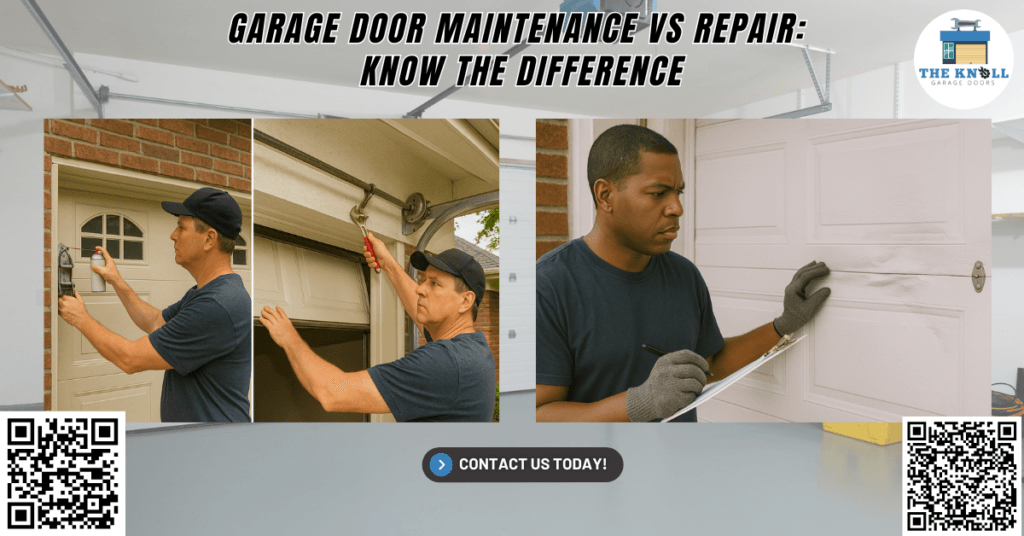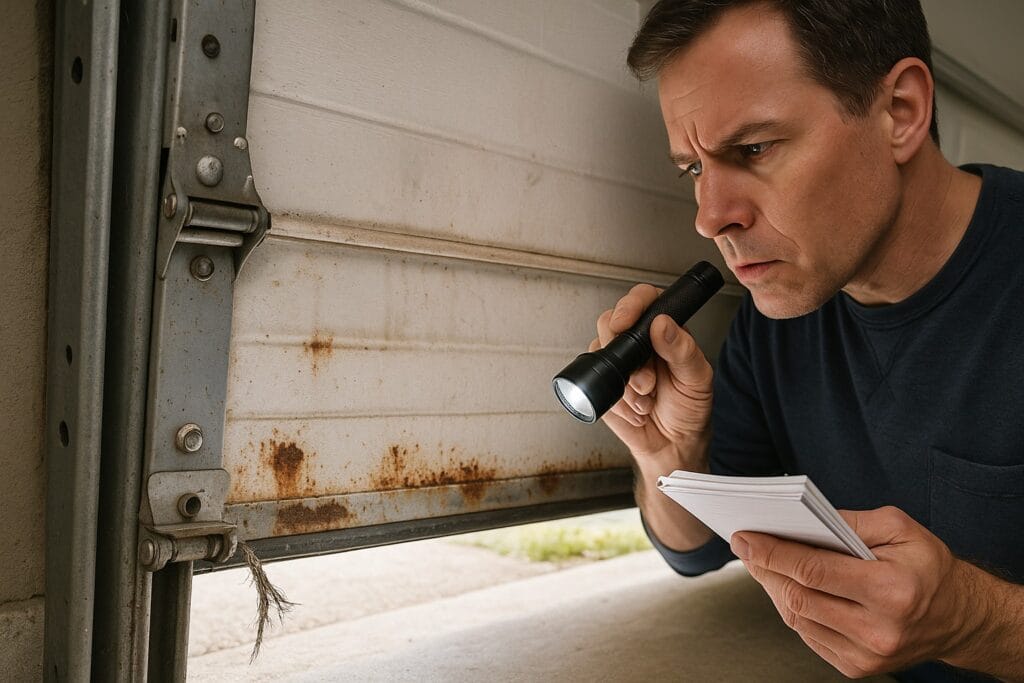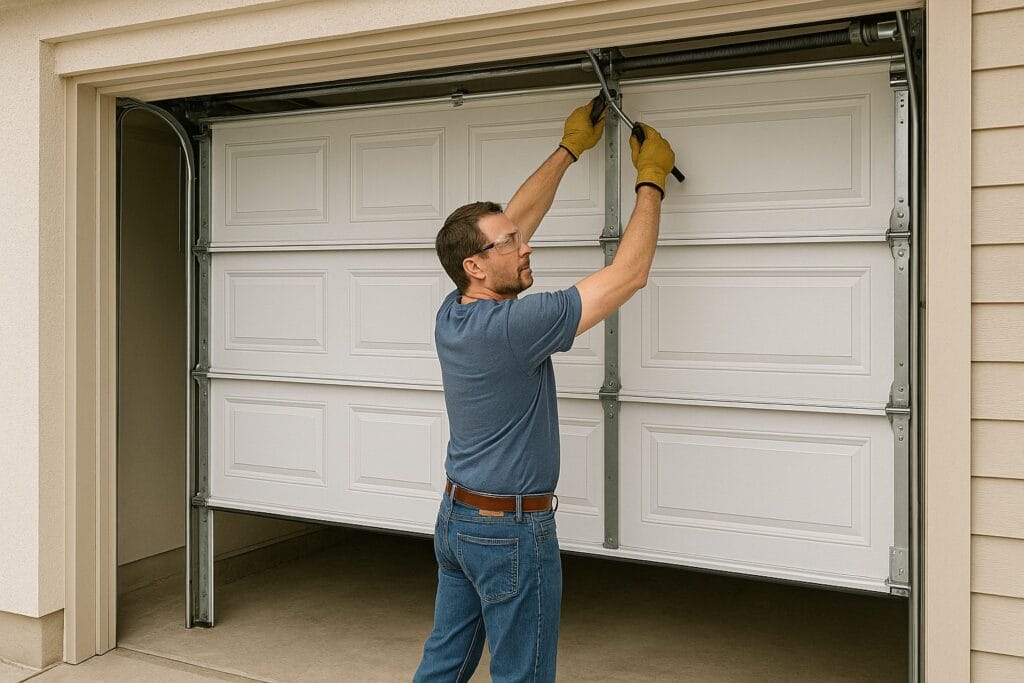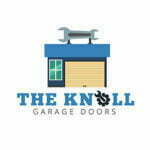Garage Door Maintenance vs Repair: Know the Difference

Imagine waking up on a stormy morning in College Station, TX, ready to head to work, only to find that your garage door won’t open. That exact situation happened to one of our local clients. It turned out that a rusted spring had snapped overnight. With no prior warning and no recent maintenance, the door was rendered inoperable. This costly, time-consuming repair could have been avoided with a simple yearly inspection.
Another homeowner near Wolf Pen Creek found themselves in a bind when their garage door opener stopped mid-operation. It turned out that debris had jammed the garage door tracks and damaged the rollers. Again, a little garage door maintenance would have spotted the issue early, potentially saving hundreds of dollars and hours of stress.
According to the U.S. Consumer Product Safety Commission, there are over 20,000 garage door-related injuries in the U.S. each year. Many of these could be prevented through proper upkeep. The distinction between maintenance and repair isn’t just about timing; it’s about safety, cost, and peace of mind. Understanding when to maintain and when to repair can save your family from unexpected headaches, ensure quiet operation, and enhance the performance of your garage door system over the years.
What Is Garage Door Maintenance?
Garage door maintenance refers to the regular upkeep tasks done to ensure your garage door system functions smoothly, quietly, and safely over time. It involves inspecting, cleaning, lubricating, and tightening key components. Regular maintenance not only prolongs the lifespan of your garage door and opener but also prevents the need for emergency garage door repairs.
Garage doors are made up of several moving parts, including torsion springs, cables, hinges, rollers, and the opener system. These parts are subject to wear and tear due to daily usage, weather exposure, and time. By conducting regular maintenance, homeowners can catch minor issues early before they escalate into major problems.
Key Maintenance Tasks
- Visual Inspection
- Check the garage door springs, rollers, hinges, cables, and garage door tracks for signs of wear, rust, or damage.
- Look for cracked weatherstripping, frayed cables, or sagging panels.
- Watch for loose bolts, nuts, and roller brackets that could cause uneven movement.
- Inspect for rust spots on steel doors and signs of water damage on wood doors.
- Lubrication of Moving Parts
- Use white lithium grease or a spray lubricant specifically made for garage door parts.
- Focus on metal parts like hinges, torsion springs, and rollers.
- Lubrication reduces friction and prevents noise, ensuring smooth operation.
- Avoid using heavy oil-based lubricants that can attract dust and debris.
- Tightening Hardware
- A socket wrench is ideal for tightening roller brackets, arm bars, hinges, and top rails.
- Over time, these parts loosen from daily use and vibrations.
- Secure hardware prevents misalignment and ensures structural integrity.
- Testing the Balance and Auto-Reverse
- Disconnect the automatic opener using the release handle and manually lift the door halfway.
- If it doesn’t stay in place, the torsion springs might be unbalanced.
- Test the auto-reverse feature using an object like a 2×4 and ensure the safety features work correctly.
- Misaligned sensors or worn springs can disable these features, leading to safety hazards.
- Cleaning and Removing Debris
- Use a vacuum or blower to clear dust and grime from garage door tracks.
- Wipe down panels and sensors with a damp cloth.
- Remove leaves, cobwebs, and any objects that may obstruct the garage door operation.
- Inspect Weatherstripping
- Look for cracks or gaps where water or cold air can enter.
- Replace worn weatherstripping to prevent water damage and improve energy efficiency.
- Proper sealing helps maintain indoor temperatures and reduces pest entry.
- Check Garage Door Opener Settings
- Ensure your garage door opener opens and closes the door completely.
- Adjust force settings if the door struggles during movement.
- Confirm that wireless remotes and backup battery systems are functioning correctly.

Frequency of Maintenance
- Residential Garage Doors: At least once per year, ideally before seasonal weather changes.
- Commercial Garage Doors: Every six months, or more if the door cycles multiple times daily.
- Heavily Used Doors: Doors used multiple times per day, such as in large households or busy facilities, should be inspected quarterly.
What Is Garage Door Repair?
Garage door repair is the process of fixing parts that are damaged, broken, or malfunctioning. It’s a reactive solution, meaning it happens after a problem has already caused issues. When maintenance is skipped, repairs are inevitable.
Repairs are often more expensive than maintenance, especially if they involve multiple parts or require emergency service. A broken garage door can prevent access to your vehicle, expose your home to security risks, or even create a safety hazard for your family.
Common Garage Door Repairs
- Broken Torsion Springs
- Springs handle the bulk of the door’s weight. When they snap, your door won’t open.
- Torsion spring replacement is a high-tension, dangerous task best left to professionals.
- Damaged Garage Door Tracks
- Tracks can become bent from impact or misalignment.
- If the door is off-track, it may hang unevenly or get stuck.
- Repair may involve realigning or replacing the track system entirely.
- Malfunctioning Garage Door Opener
- Problems include broken gears, wiring issues, or circuit board failures.
- Newer openers like Stealth Drive Connect offer advanced features but still need maintenance to prevent failure.
- Frayed or Snapped Cables
- Cables work with the springs to lift the door.
- Fraying can cause sudden failure, slamming the door shut.
- Cable repairs should always be done with the door securely braced and tools in place.
- Panel Damage and Rust Spots
- Dents, cracks, or corrosion can impact insulation and structural integrity.
- Damaged panels on steel or wood doors can be replaced individually or in sets.
- Sensor Alignment and Replacement
- Misaligned or dirty sensors can stop the door from closing.
- Sensor replacement ensures the door recognizes obstructions and prevents accidents.

Key Differences Between Maintenance and Repair
Feature | Garage Door Maintenance | Garage Door Repair |
Timing | Scheduled in advance | Unplanned, when a part breaks |
Goal | Prevent problems | Fix existing problems |
Frequency | Annually or bi-annually | As needed |
Cost | Lower, predictable | Higher, can vary depending on issue |
Time to Complete | 1-2 hours | Varies: 1 hour to multiple days |
Typical Tasks | Lubrication, tightening, inspection | Replacing springs, cables, panels, or openers |
Impact on Daily Use | None or minimal interruption | Often requires halting garage door use |
Garage door maintenance is about prevention, while repair is about correction. Investing in a regular maintenance routine can help avoid the disruption and expense of emergency repairs.
Why Maintenance Prevents Major Repairs
Preventative maintenance is your best line of defense against emergency repairs. Every moving part in your garage door system is under stress multiple times a day. Without care, they degrade quickly, leading to malfunctions.
Benefits of Regular Maintenance
- Quiet Operation: Proper lubrication reduces noise during lifting or closing.
- Extended Lifespan: Doors can last 15-30 years with proper care, while neglected doors may fail in less than a decade.
- Improved Safety: Regular testing of the auto-reverse feature and torsion spring tension ensures your door doesn’t become a hazard.
- Better Weather Protection: Functional weather stripping and sealed panels keep out moisture and reduce energy bills.
- Lower Long-Term Costs: Maintenance is affordable. Repairs and part replacements? Not so much.
- Increased Home Value: A well-maintained garage door adds curb appeal and resale value.
Signs You Need Maintenance vs Repair
You Likely Need Maintenance If:
- Your garage door is louder than usual but still operates.
- It has been over a year since your last inspection.
- The door vibrates or wobbles during operation.
- You want to preserve quiet, smooth operation.
- You notice minor rust, but parts are still intact.
You Likely Need Repair If:
- The door won’t open or close at all.
- You hear a loud bang (a sign of a broken spring).
- The opener runs, but the door stays in place.
- The door is stuck or uneven.
- You notice frayed cables, rusted springs, or broken sensors.
DIY vs Professional Service
DIY Maintenance: What You Can Handle
- Lubricate garage door rollers, hinges, and tracks with white lithium grease.
- Vacuum and wipe down tracks to remove dust and debris.
- Test the door’s balance and auto-reverse using a simple step-by-step guide.
- Check and replace weatherstripping as needed.
- Inspect batteries in remotes and clean the photo-eye sensors.
Tasks for Professionals Only
- Replacing or adjusting torsion springs
- Repairing snapped cables
- Fixing electrical components in garage door openers
- Realigning bent garage door tracks
- Replacing motor gears, sensors, or circuit boards
Garage door systems have high-tension parts. A DIY mistake can cause injury or damage. We always recommend calling a trusted local technician like The Knoll Garage Doors for major repairs or adjustments.
Common Garage Door Maintenance Tools & Supplies
- Socket wrench set for tightening bolts
- Spray lubricant or white lithium grease
- Soft cloths for cleaning panels
- Level to test door alignment
- Step ladder to access high parts like the top rail
- Vacuum for removing dust from tracks
- Sealant or weatherstrip replacement for protection
- Screwdriver, pliers, and adjustable wrench for minor fixes
Why Garage Door Maintenance Is Vital in College Station, TX
Our Central Texas weather can take a toll on your garage door system. From heavy rains and high humidity to intense summer heat, your garage faces year-round stress.
- Humidity accelerates rust on metal parts like hinges, springs, and tracks.
- Extreme heat causes metal expansion, impacting the balance and function.
- Storms can damage sensors or lead to electrical failures in automatic openers.
- Frequent daily use by large families or active households means parts wear out faster.
- Pollen and debris during springtime can clog rollers, sensors, and tracks.
Regular garage door maintenance ensures your door operates properly through all seasons, preventing weather-related damage and ensuring the safety of your home and family.
Final Thoughts
Your garage door is one of the largest and most frequently used moving parts in your home. It provides access, security, insulation, and even boosts your home’s curb appeal. Neglecting garage door maintenance can lead to expensive and inconvenient repairs, and in some cases, serious injury or property damage.
By investing in scheduled upkeep and understanding when to call for professional repair, you can extend the lifespan of your garage door system, ensure your family’s safety, and avoid emergency breakdowns. From lubricating hinges to replacing worn torsion springs, every task plays a role in the overall health of your garage door.
Whether you’re a first-time homeowner or a seasoned family handyman, knowing the right balance between garage door maintenance and repair helps keep your garage safe, efficient, and operational year-round.
How Can The Knoll Garage Doors Help You?
At The Knoll Garage Doors, we specialize in providing expert garage door service tailored to both homes and commercial properties in College Station, TX, and surrounding areas. Located at 2322 Texas Ave S, College Station, TX 77840, our team of certified technicians is ready to help with all your garage door repair, maintenance, and installation needs.
Why Choose Us?
- Over 10 years of experience serving Brazos County
- Fast, reliable response times
- Honest assessments with no hidden fees
- Custom maintenance packages to fit your needs
- Licensed, bonded, and insured professionals
- Specialists in garage door openers, springs, tracks, and safety features
Whether you need torsion spring replacement, opener repair, weather seal installation, or a routine tune-up, our team ensures quiet operation, safety, and long-term reliability for your garage door system.
📞 Call us today at (979) 978-0221 to schedule your preventative maintenance or emergency repair. Your garage door deserves the best—The Knoll Garage Doors is here to deliver it!
Frequently Asked Questions (FAQs)
1. How long do garage door springs typically last?
Torsion springs usually last between 7 to 10 years or around 10,000 cycles, depending on usage and climate conditions.
2. Can I use WD-40 to lubricate my garage door parts?
No, WD-40 is a cleaner and not a proper lubricant; use white lithium grease or a designated garage door spray lubricant instead.
3. What should I do if my garage door remote stops working?
First, replace the battery and check for signal obstructions; if the problem continues, reprogram the remote or inspect the opener.
4. Do garage doors need to be insulated in Texas?
Insulation is not required but is highly recommended in Texas to reduce heat transfer, lower energy bills, and improve overall comfort inside the garage.
